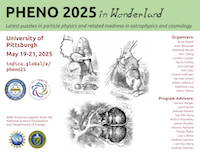Speaker
Description
The long-standing discrepancy between late and early-time measurements of the Hubble parameter has given rise to a tension that has been resistant to a satisfactory theoretical explanation, even as the statistical tension has grown to about 4-6$\sigma$. In this work, we present a novel idea designed to alleviate this tension. Taking dark matter to consist of a population of primordial black holes of asteroid mass or greater with high initial spin, the process of superradiance can facilitate conversion of the black holes' angular momentum into relativistic particles that escape the black holes' influence. We demonstrate that this process leads to a unique effect on cosmological evolution that can modify the present day value of the Hubble parameter.

